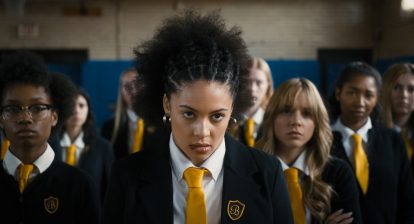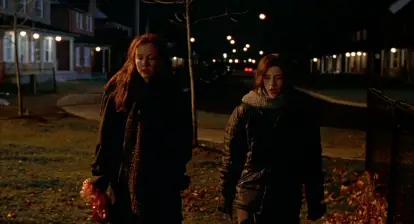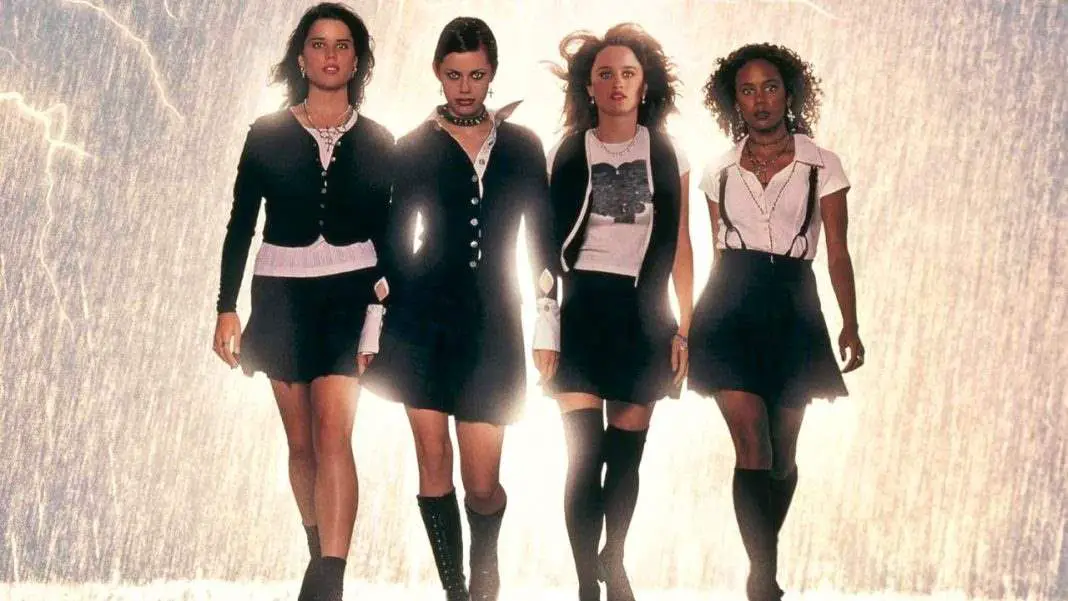The release of Black Christmas 2019 brings with it a lot of baggage, given the title’s connection to the beloved 1974 original and its unfairly maligned, yet inarguably messy, 2006 remake. Haven’t we seen this story twice before, scream the denizens o Twitter. Though there are nods to the original movie throughout (one, involving the dress in which a young woman was sexually assaulted being re-utilized as a weapon, is a particular standout) this is very much its own film. It’s a film inescapably of this particular time in history, created by two women (Sophia Takal and celebrated film critic April Wolfe, who co-wrote the script with the director), who, like the rest of us, are all out of f***s to give. Unsurprisingly, the men, both critics and patrons alike, have either dismissed or outright hated it often, at least in the case of the latter, sight unseen. It’s a familiar pattern (see: Ghostbusters 2016) that feels depressingly, and yet still inevitably, ironic in the case of this movie.
English actress Imogen Poots, who’s been struggling to find a role worthy of her considerable talents following her scene-stealing turn in another vitriolic, politically-charged horror movie, Green Room, is Riley, our ostensible Final Girl. A pretty sorority type rendered introverted to the point of almost literally hibernating from real life thanks to a brutal rape a few years previous, she’s getting ready for a lonely Christmas break at school while her friends are away having fun with their families when one of their number goes missing. She reports the incident to campus law enforcement but finds them frustratingly unwilling to help, a familiar reaction considering nothing was done in the wake of her assault.
Related: Assassination Nation is Unapologetically Feminist and Should Be Celebrated
In fact, Riley’s assailant, who graduated a few years previous, is back on campus for a festive frat party. Cleverly embodied by a chiselled-jawed, nondescript white bro who’s constantly chewing gum, her attacker happily integrates back into the fold while poor Riley tries to keep it all together, forced to be aware of him even when not in his presence. Things take an interesting turn when Riley and her sisters perform a number that at first seems like a sexy, Mean Girls-esque routine before morphing into a damning indictment of the school’s widespread, unchecked misogyny. To say it doesn’t go down too well would be an understatement, but it lights a fire under Riley and they make their point to other possible victims one of whom is rescued by Riley herself from the clutches of another opportunistic frat boy.
Elsewhere, her fiery friend Kris (enthusiastically embodied by Aleyse Shannon) has already succeeded in getting a bust of the school’s founder, who has a dodgy past with slaves and dark magic, removed and is now working on having Professor Cary Elwes (complete with English accent, so we know not to trust him) fired because he refuses to teach anything but straight, white male writers in his class. Suffice to say, when the girls (“Women!” corrects one of them from the stage as their routine begins, hilariously) start being targeted proper, they’re told by basically every man in sight that they deserve it. What, did you think you could just publicly call out these men and there would be no consequences? Did you, Sophia and April!? How dare you! Watch me punch the screen in anger before demanding my money back for a film I refused to watch in the first place because feminism is cancer! #NotAllMen, damn it!
Black Christmas is a darkly satisfying little festive surprise, not least because the spoilerific trailer seemed to give away all its best bits. Thankfully, even the brilliantly executed opening — which plays on every woman’s reaction to walking home alone while seemingly being followed by a creepy man — has a sting in its tail not glimpsed in previously released footage. There are those who argue there’s no reason to see the movie if the trailer gives so much away, but Takal and Wolfe’s script is bursting to absolute breaking point so there’s no way its genius could possibly be captured in even the best 3-minute clip. This is the kind of movie that could only have been dreamed up by women, whether it’s the hilariously gross reference to friends sharing a Diva cup (which pays off in a big way, too) or one sorority girl’s “Your manologue is boring me” T-shirt (side note: where can I purchase one, like, now?).
This is a sharply written take-down of rape culture, particularly in colleges, which also touches on the idea of PC culture gone crazy when Riley fights with Kris for going too far and pushing everybody away — something many of us worry about when confronted by men we supposedly trust arguing that we’re doing more harm than good by speaking up. Tellingly, as well as tearing down the obviously bad men, Black Christmas also takes aim at the supposedly good guys who stand by and say nothing or are part of the problem because they won’t take issue with their own internal prejudices, like someone who proclaims himself to be a feminist on social media but then questions why you’re “dressing like that” when you complain about unwanted male attention. One character’s boyfriend actually makes the #NotAllMen argument, to the disgust of every woman present.
Black Christmas is a rallying cry for all of us to be fighters, to stop just accepting that this is how things are, and to take control of our destiny, spirited by a string of strong and utterly unvarnished performances from impressively normal looking women. Poots gives it her all, whether communicating a wealth of buried emotion with a look or reasoning with a dumb male to stay quiet lest the killer stalking their house realizes where they are. She’s ably supported by Shannon, Lily Donoghue, Brittany O’Grady as her equally strong and yet clearly defined sisters and charmingly inept Caleb Eberhardt as possible love interest Landon who, crucially, doesn’t try to save the day but rather asks Riley how he can help and support her. It’s a small difference, but it means a lot in a movie populated by strong female characters that a man, no matter how nice, isn’t required to rescue them.
And yet, in spite of its strong, well-considered and hugely empowering political message, this isn’t a preachy movie (and, to be clear, any men who think it is might want to take a look inwards before commenting and showing themselves up). Black Christmas is a fun, and frequently very funny, movie with a touch of Happy Death Day‘s “you sneaky little beyotch” spirit but, obviously, with a darker heart. Much was made of its PG-13 rating (15A in the UK and Ireland) but, similar to that other lively, female-led Blumhouse offering, making the kills swift and bloodless doesn’t necessarily rob them of the potential to shock us. The jolts (I’d hesitate to call them jump scares, for obvious reasons) are impeccably well-timed, even for this seasoned horror vet.
Black Christmas is a scary film, plain and simple. It’s not necessarily designed for the Friday night multiplex crowd, the kind who attends screenings of La Llorona just to yell “don’t go in there!” at the screen before collapsing in laughter with their friends; this is a smarter, more considered effort that plays on the idea of somewhere, in this case a sorority house, turning violently from a place where women feel completely safe and secure to a cavernous death trap full of dark corners and sharp edges. There’s plenty of invention here too, from the aforementioned death-by-dress (suck it, In Fabric) to a death-by-icicle and even the implementation of a classic, and highly underused, horror weapon in the form of a crossbow (the last movie I can recall utilizing one was We Need to Talk About Kevin).
The rating has precisely zero impact on its scare appeal, rather it’s an opportunity to drag cousins and little sisters to see a movie that, with any luck, will impact not just their perception going forward in life but the make-up of horror in general. The demand is there, we just have to be given the chance. The past few years have given us Revenge, which retooled the rape revenge sub-genre for women, Raw, which did the same for cannibalism, and Assassination Nation which, although the work of a man (Sam Levinson), took a scalpel to MRA culture with as little subtlety as a blunt axe. Black Christmas bears the most resemblance to Levinson’s film, due to its gloriously unapologetic viewpoint, but it sits comfortably alongside the other two as a horror movie intent on breaking boundaries while also still being, you know, a great horror move in its own right too.
See Also: Is Black Christmas (2006) Really That Bad? Yes. Yes it is.
The harsh, unwarranted backlash to this movie is unsurprising, but it shouldn’t put you off, particularly if you’re a female horror fan, or just a proud feminist who’s sick of defending your “Men Have Made A Lot of Bad Art” T-shirt from those so desperate to cling to power, and so terrified of losing it, they refuse to acknowledge the shortcomings of their brethren. Black Christmas boasts a female empowerment team-up moment that’s so incredibly satisfying and well-earned, it exposes in just a few short, bloody minutes, how empty, pandering, and shallow the supposed “girl power” shot in Endgame was — the difference, of course, was that eye-roll-worthy moment was on their terms and this is on ours. Just consider, if the ladies of Black Christmas could see the reaction their story is getting from dudes online, they’d roll their eyes too. That should be more than enough of a reason to get out there and support this movie.
Wicked Rating: 8/10
Director(s): Sophia Takal
Writer(s): Sophia Takal, April Wolfe
Starring: Imogen Poots, Cary Elwes, Aleyse Shannon, Lily Donoghue
Release date: December 13th, 2019
Studio/Production Company: Universal / Blumhouse
Language: English
Run Time: 92 minutes
Follow us on social media: Twitter, Facebook, Instagram, and YouTube.





